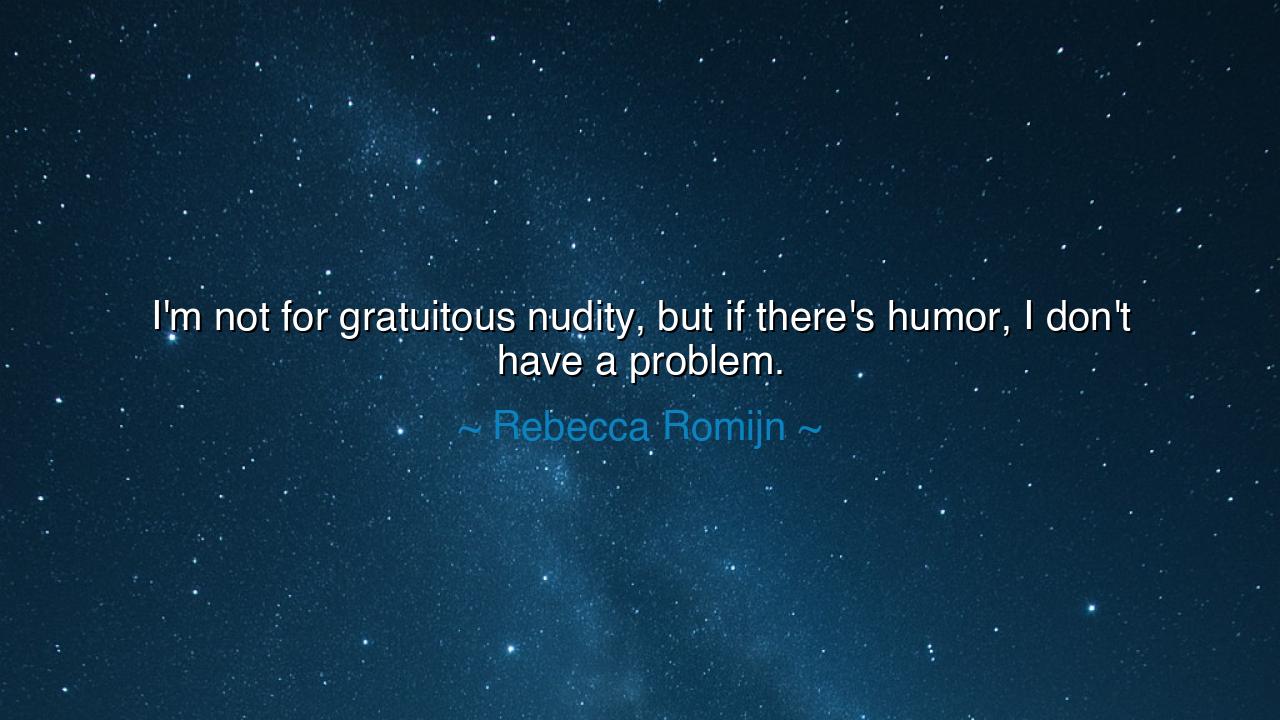
I'm not for gratuitous nudity, but if there's humor, I don't have






In the words of Rebecca Romijn, “I’m not for gratuitous nudity, but if there’s humor, I don’t have a problem.” At first, this may seem a statement about art and performance, about the body and its place in entertainment — yet within it lies a deeper wisdom about intent, context, and the sacred balance between dignity and expression. It is a reminder that not all exposure is indecency, and not all concealment is virtue. For what matters most in any act is not what is seen by the eyes, but what is meant by the heart.
Romijn’s words speak from the realm of the artist, where the human form is both a vessel of beauty and a tool of storytelling. In saying she opposes “gratuitous nudity,” she draws a line between what is done for truth and what is done for spectacle. The ancients, too, understood this distinction. The sculptors of Greece, who carved the human form in marble, did not do so to provoke desire but to celebrate divine proportion. To them, the body was sacred geometry — a reflection of cosmic harmony. The nudity of their art was not vulgar, for it was filled with reverence and purpose. Yet when art falls into vanity, when exposure becomes empty provocation, it loses its soul and becomes noise.
When Romijn says that she has “no problem if there’s humor,” she points to a truth the wise have long known — that humor purifies. Laughter, when honest, can turn shame into light, awkwardness into connection. The body, when seen through humor, loses its burden of taboo and becomes part of the shared human story — flawed, funny, familiar. In this, humor acts as a bridge between the physical and the spiritual. It frees us from the fear of imperfection, reminding us that our bodies, though temporary, are instruments of joy.
In ancient times, the playwright Aristophanes of Athens understood this well. His comedies, though filled with boldness and irreverence, were not made to mock the sacred but to awaken it through laughter. His audiences, unashamed of the body’s presence, found in humor a reflection of themselves — their vanity, their desire, their folly. Through laughter, they saw truth unveiled. So too, Romijn’s acceptance of humor in art suggests that when laughter accompanies exposure, the act becomes human, not exploitative; it becomes a mirror rather than a weapon.
Her quote is also an invitation to look inward and examine our intentions — for every action, whether of art or of life, holds both power and consequence. Gratuitousness, in any form, arises when meaning is lost — when one acts not to express truth but to seek attention. The ancients warned against this vanity. The Stoics taught that beauty without purpose is emptiness, and freedom without restraint leads to ruin. To act with purpose, then, is to bring light to what is dark; to use the body not as ornament, but as instrument — a vessel for meaning.
There is, too, a hidden courage in Romijn’s words — the courage to face judgment and to discern her own boundaries. For every soul must learn to decide what aligns with their sense of truth and what dishonors it. To say “I don’t have a problem if there’s humor” is to declare independence from rigid purity and false morality. It is to live guided by discernment rather than by fear. The wise do not shun the body, nor worship it; they honor it as part of the whole — to be respected, but not feared.
Let this, then, be the teaching drawn from her words: judge not the act by its form, but by its intention. Whether in art, in love, or in expression, seek the motive that lies beneath. If it uplifts, if it enlightens, if it brings joy or reflection — it is sacred. But if it degrades, objectifies, or blinds — turn away. The measure of all things, said the philosophers, is not what is seen, but what is meant.
So, my listener, learn to live with both reverence and laughter. Do not recoil from the human form, for it is your own; nor surrender it to shallowness, for it was made for wonder. Be like the artist who sculpts with purpose and the sage who laughs with purity. Reject the gratuitous, embrace the meaningful, and let humor light your path. For in that balance — between dignity and delight, between truth and joy — lies the harmony of the soul, as ancient as creation itself.






AAdministratorAdministrator
Welcome, honored guests. Please leave a comment, we will respond soon